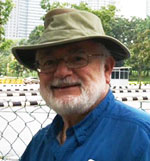My Polish Honeymoon and The Dancing Dogs of Dombrova
By Oliver B. Pollak

ALBANY, California – What do you get when you have two films: a husband with a wife from Paris who wants to bury her one-year-old son’s foreskin in Poland; and a brother and a sister from Toronto who want to dig up the bones of their grandmother’s dog Peter in Poland to put in her grave in Canada? These aberrant stories are accompanied by too much vodka, retrograde horses pulling wagons and cows in the streets. These comedic dramas are beset with three generation Holocaust trauma, marital discord, and sibling rivalry. While both stories are improbable, they raise deeper issues about the Holocaust as a subject for entertainment.
The 39th annual 18-day long San Francisco Jewish Film Festival featured 65 films in English, Hebrew, French, Swedish, Italian, Yiddish, German, Russian, Spanish and two set in Poland, the subjects of this review. The films are shown all over the San Francisco Bay area, including Albany, where I saw these two.
Elise Oztenberger, an actress and a writer, directed My Polish Honeymoon (Lune de miel) which appeared in 2018. Anna is obsessed with declaring her Jewish identity in Poland on the occasion of her husband Adam’s family being honored on the occasion of the 75th anniversary of Nazi atrocities in a small Polish town. Adam is not keen on going to Poland, but submits to his wife’s will. The story is filled with ghosts of unresolved mother-daughter issues. Anna and Adam are almost totally in the dark about the lives of their grandparents in Poland and in the Holocaust. This situation is all too common among the 2nd and 3rd generation of survivors. The elders did not want to trouble their offspring, the children did not want to hurt their elders, a tacit agreement of multigenerational silence, which leaves a haunting chasm of ignorance. This French film with English subtitles and strains of Chopin received light audience applause.
Zack Bernbaum of Toronto directed The Dancing Dogs of Dombrova which also appeared in 2018. Siblings Aaron and Sarah are on a quest to fulfill their bubbe’s dying wish of being buried with Peter her dancing dog. Aaron, an Ottawa bureaucrat, and Sarah, a recovering alcoholic, participate in a farce to find and disinter the dog’s skeleton. There is no pet cemetery but with almost divining directions they dig out bones and a leather dog collar with a dog tag inscribed Piotr. At 10:10 pm, the performance received almost no applause. Some cinema devotees in the audience had seen four films that day.
The French and Canadian tourists speak no Polish. They are like fish out of water going back to where their ancestors had been violently rejected. The Poles are stereotyped as hard vodka drinking louts, an overbearing Catholic hierarchy, recidivist anti-Semitism, a criminal underworld, and making money from Jewish tourists, a Disneyland of the Holocaust.
I make no larger judgment to the question of whether novels about the Holocaust, and fiction films about the Holocaust demean and trivialize the Holocaust. There is clear evidence and personal experience that Holocaust trauma influences and manifests itself in subsequent generations. To paraphrase Nobel Laureate Doris Lessing about the First World War, you do not have been in the war to be done in by the war. The Holocaust will continue to provide fertile ground for sometimes macabre, thoughtful, sorrowful, heroic, and dark entertainment. The tragedy of war, rich in pathos and bitterness is continually stoked by memories and emergent scholarship. The 21st century echoes and live shrill voices will continue to provide film makers the inspiration to explore, eke out, and spotlight shaded corners, manipulate, and project, that is the art of imagination.
*
Pollak, a professor emeritus of history at the University of Nebraska Omaha, and a lawyer, is a correspondent now based in Richmond, California. He may be contacted via oliver.pollak@sdjewishworld.com